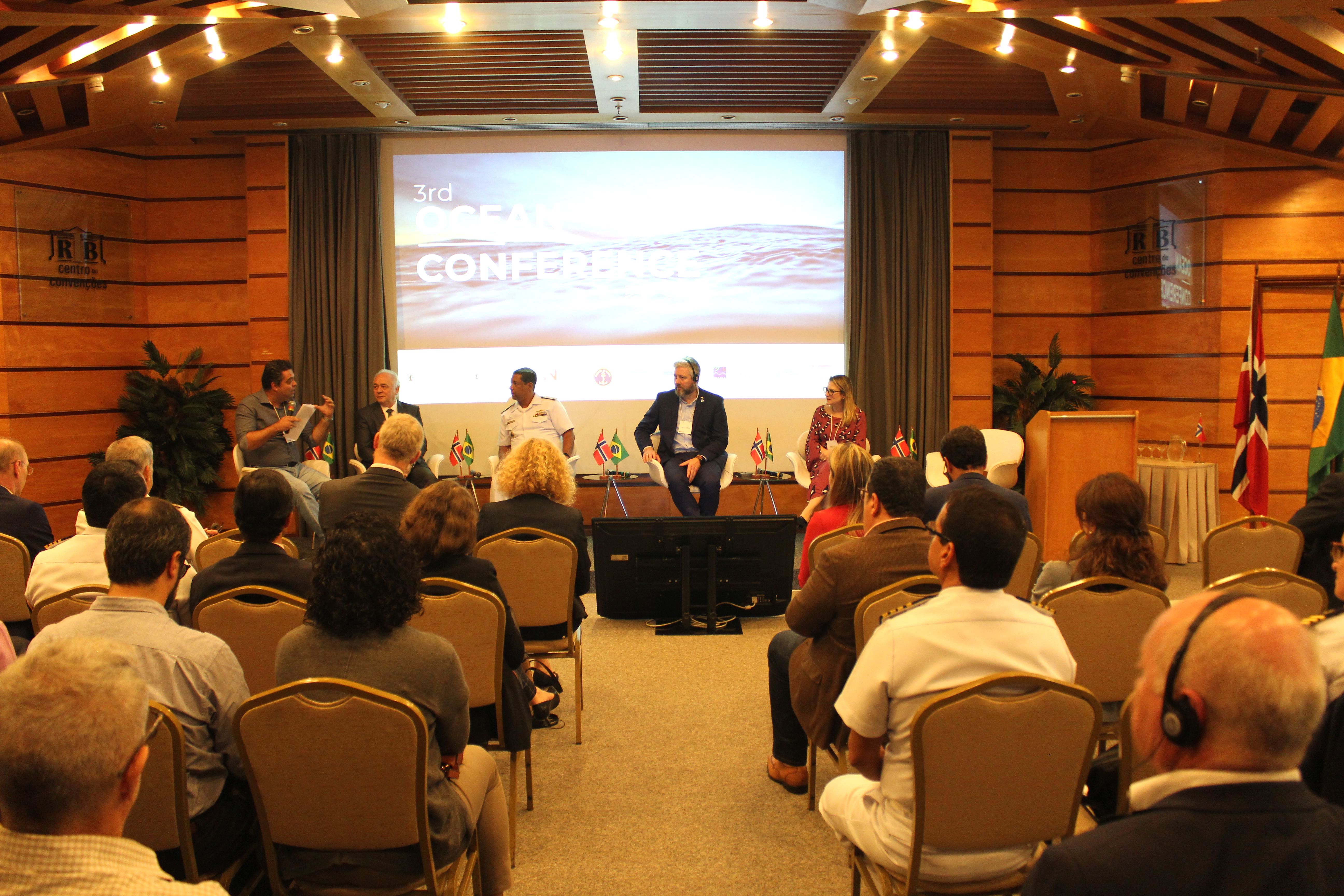 The 3rd Ocean Conference, an event that integrates the Norway Brazil Weeks agenda, addressed how to guarantee blue growth without overloading the oceans.
The 3rd Ocean Conference, an event that integrates the Norway Brazil Weeks agenda, addressed how to guarantee blue growth without overloading the oceans.
See video from the event by clicking here!
According to the Organization for Economic Cooperation and Development, the ocean economy’s long-term potential in terms of growth and job creation cannot be fully realized unless more effective steps are taken to improve the integrated ocean management.
Oceans contribute to employment, revenues, technological development, food production, transport, energy, travel, and can represent as much as 3-5 percent of global GDP. As countries with long coastlines and large ocean recourses, this represent enormous opportunities and challenges for both Brazil and Norway. In order to harvest the oceans resources sustainably, we need to manage them well, nationally and internationally.
Building on the areas of mutual interest in managing and developing ocean resources, the ocean conference, organized for the third consecutive year, aspired on establishing a Norwegian-Brazilian partnership for productive and sustainable oceans, unlocking its economic and social potential.
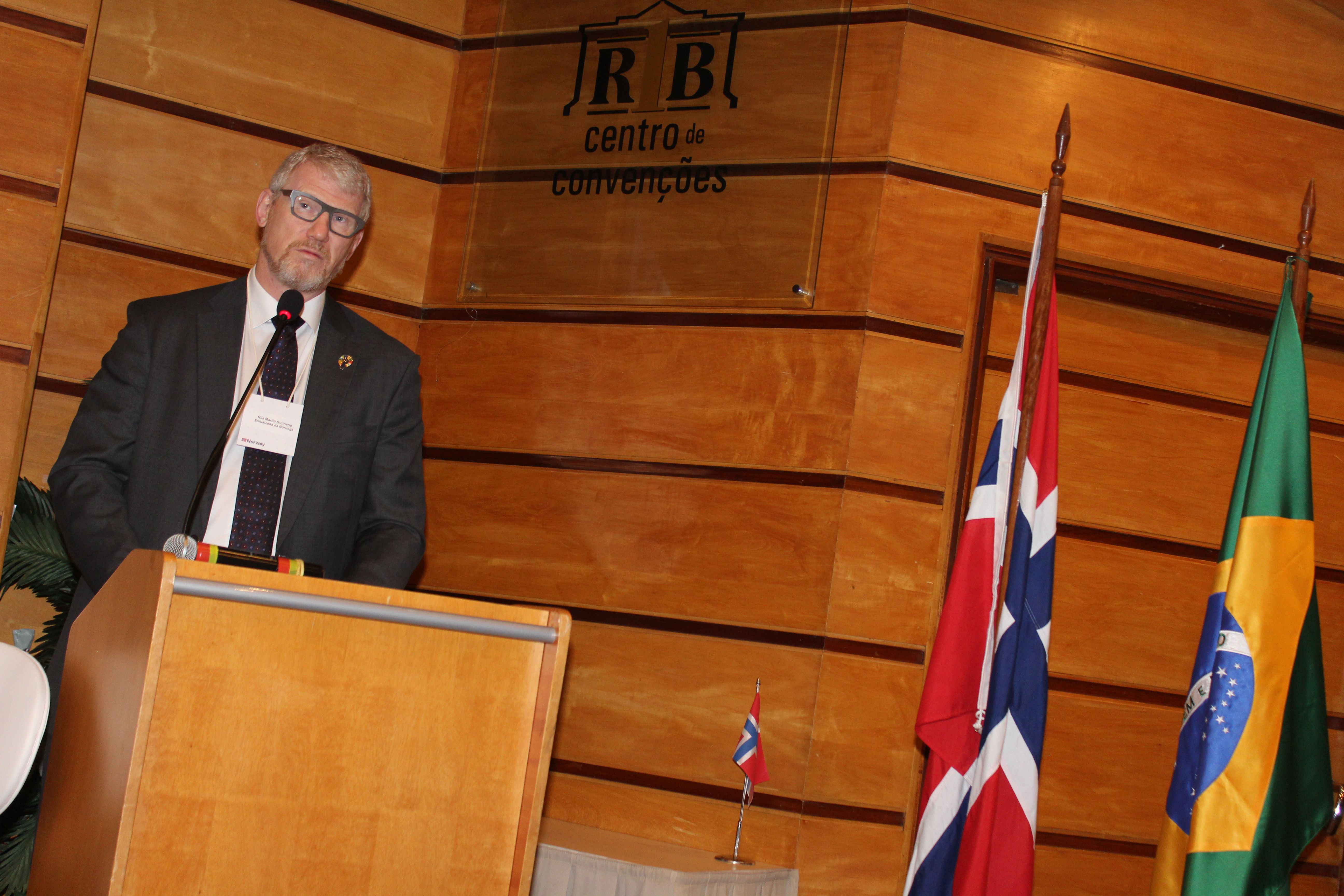 On November 12, 2019, it was Norway´s ambassador Nils Martin Gunneng who set the stage with a presentation on how the oceans has contributed to the Norwegian economy.
On November 12, 2019, it was Norway´s ambassador Nils Martin Gunneng who set the stage with a presentation on how the oceans has contributed to the Norwegian economy.
«The sea has shaped Norway´s history. 70 percent of Norway´s exports come from the ocean industries. In Brazil, Norway´s accumulated direct investments are now in the range of USD$ 25,5 billion, and most of this is ocean-based. Norway and Brazil are both marine nations and we both see the potential the ocean offers. But we also see the challenges and threats. Climate change, overfishing, pollution and oil spills. It is a fact that the oceans are becoming warmer, less acid, less salty and this affects marine life, sea levels and weather systems. We need to act now to restore the regenerative power of the oceans, that also enormous capacity as a carbon sink. Governments hold the key for regulations of sustainable use, and we need science based solutions that also provide growth and new opportunities. Norway is in the forefront in some of the efforts of developing sustainable solutions, and we are actively looking for partners», Ambassador Gunneng said.
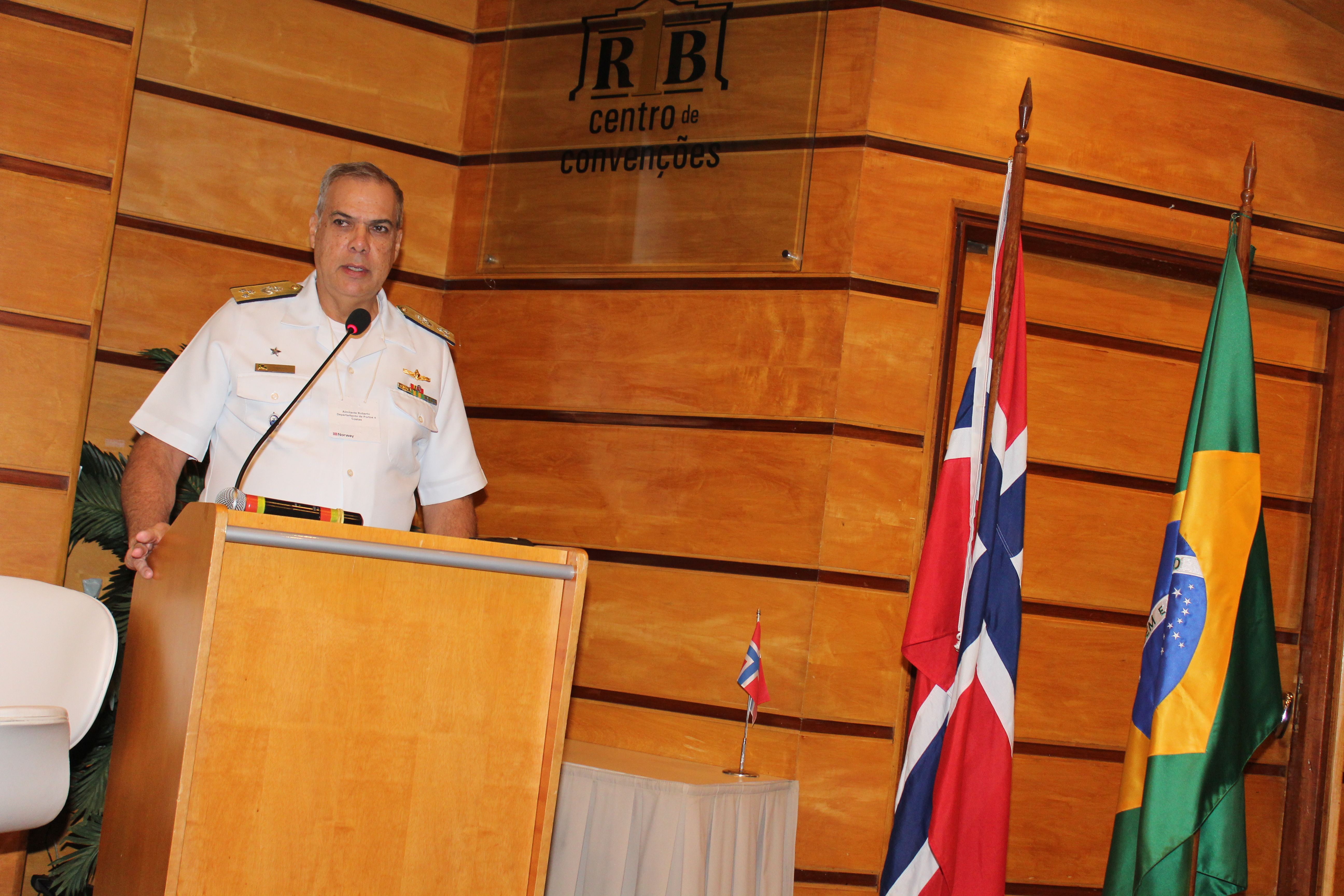 And what about the outlook for Brazil?
And what about the outlook for Brazil?
«Norway depends on the oceans and that is also our case. Our Blue Amazon has strategic importance and enormous resources. It is very important that we use venues like this conference to establish dialogue», Vice-Admiral Roberto da Cunha of the Brazilian Navy (photo to the left) said, and his comments served as the perfect introduction to the first panel that addressed how to unlock the potential of the blue economy in Brazil.
Dilemma
First speaker was NBCC president Alex Imperial, who is the VP for oil and gas South America at DNV GL. He addressed what he calls the blue economy dilemma:
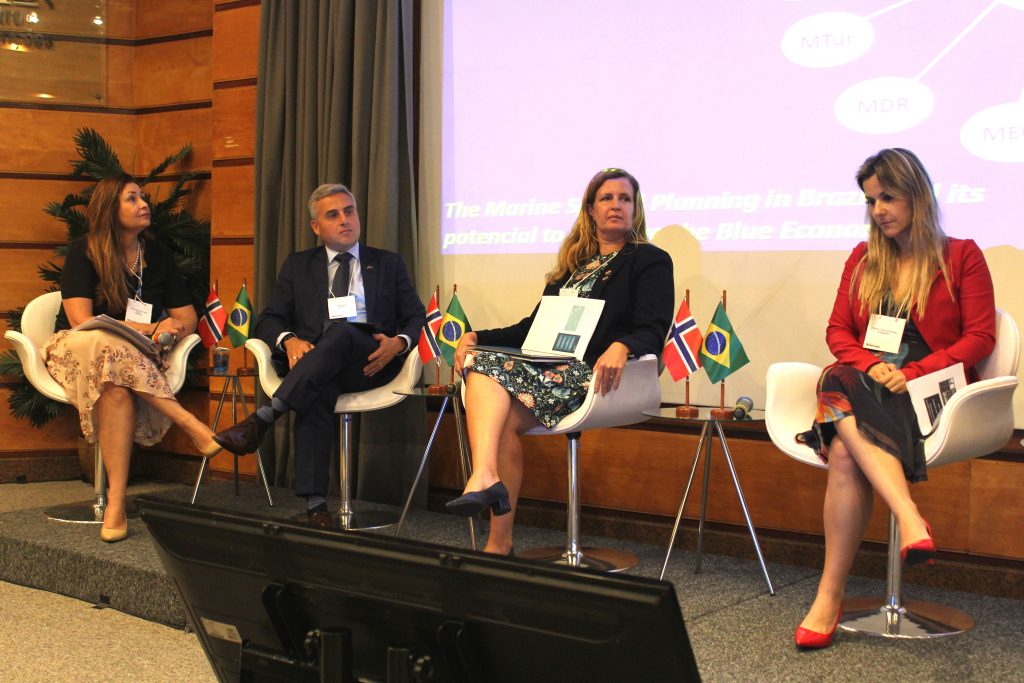
«DNV GL is well positioned to address the dilemma of the blue economy. 2/3 of our revenues are linked to the ocean and we are present in all ocean industries», says Alex Imperial.
«The global ocean economy represents US$ 1,5 trillion and the opportunities within sectors like transport, energy, food, tourism, medicine and minerals are huge. But there are downsides and the main threats to the health of the oceans are climate change, waste, habitat destruction and overfishing. 80 million tones of plastic are dumped in the ocean every year. we can only tap on the upsides, on the value from the ocean space if the ocean is healthy. The question is how to strike the right balance. We need a multi stakeholder engagement with governance and research providing a scientific basis for action», says Mr. Imperial
Norwegian companies Kongsberg and Equinor were also represented in the first panel, and according to Ana Cupelo, Sustainability Leader at Equinor, the oceans has shaped Equinor.
«The ocean is where we started our business and we are fit to develop and extend our portfolio by capturing new opportunities offshore. We have high growth ambitions and our main ambition is related to offshore wind. Equinor aims to become an offshore wind major in the world», she said.
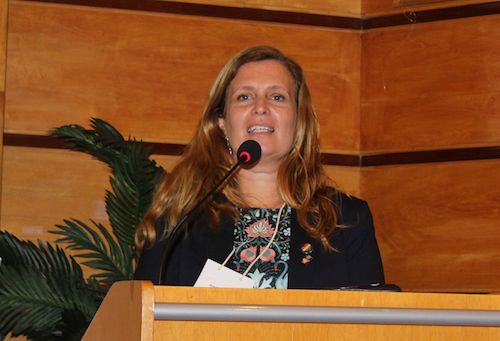
«There is a huge potential for offshore wind parks in Brazil», says Ana Cupelo
Priscila Brandão, Head of Aftermarket Sales South America of Kongsberg talked about he blue economy technology Kongsberg has developed.
«Kongsberg is in the forefront in green shipping, this is in our business strategy, and we have various solutions, like a hybrid solution using batteries, reducing fuel consumption. Kongsberg is also behind the world´s first offshore digital fish farm», she said. Ms. Brandão listed several technologies and solutions developed by Kongsberg in her presentation, like the autonomous ship Yara Birkeland.
Rodrigo Carvalho represents the interministerial commission for ocean resources of the Brazilian Navy, that coordinates several programs.
«19 percent of our GDP comes from the sea, but sustainability is a challenge. We are implementing a marine management plan to guarantee sustainable growth», he said.
The panel was moderated by Camila Mendes Viana Cardoso.
Matchmaking
The second panel of the conference focused on initiatives for sustainable ocean management. The borderless nature of the ocean makes international cooperation necessary. The panel tried to answer difficult questions like how can business friendly policies be sustainable, how are fishing, maritime transport, offshore petroleum, and other commercial activities affecting the health and wealth of the ocean and how to transfer knowledge from one sector to another?
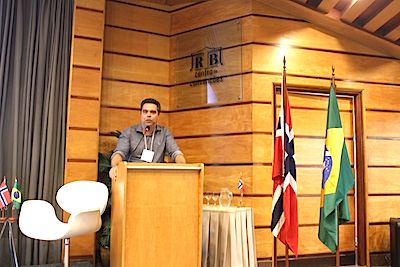 Moderator was Professor Alexander Turra of the Institute of Oceanography, University of Sao Paulo and also the UNESCO Chair on Sustainable Oceans
Moderator was Professor Alexander Turra of the Institute of Oceanography, University of Sao Paulo and also the UNESCO Chair on Sustainable Oceans
Vice-Admiral Edesio Teixeira Lima Junior of Engeprom presented initiatives for sustainable management of the ocean, and talked about the creation of a Brazilian maritime cluster
«Why are we not able to extract more of the huge potential in the ocean? It has to do with governance, institutional relations and knowledge and we need to make the ocean economy a permanent axis of development of our country», he said.
Rear Admiral Sergio Gago Guida, talked about how Secirm sees the question of sustainability of the ocean, and argued that Brazil needs to understand the huge value of the ocean economy and to create a maritime mentality.
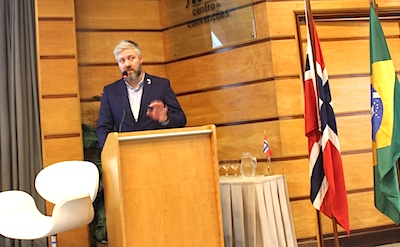 Kai Stoltz (in the photo to the left) is the Business Development Manager of GCE Ocean Technology, a Norwegian ocean cluster that has succeeded in promoting a crossover in the use of subsea technologies in new ocean industries
Kai Stoltz (in the photo to the left) is the Business Development Manager of GCE Ocean Technology, a Norwegian ocean cluster that has succeeded in promoting a crossover in the use of subsea technologies in new ocean industries
«In 2015 many got burned by the low oil price and the industry was forced to look into additional markets. This made us change our strategy and look into how to utilize experiencer and knowledge from the offshore industry going into new markets. Today we offer several training crossover programs», Mr. Stoltz said.
Michelle Duarte, Project Manager of Innovation Norway, presented the matchmaking platform «The Explorer», a marketplace of green technology from Norway created to match international needs with Norwegian solutions.
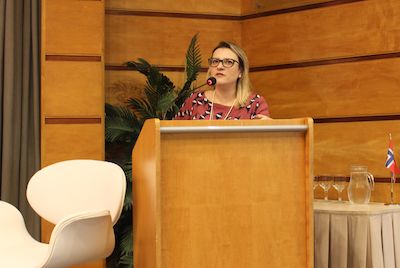
Michelle Duarte
Food and green shipping
After lunch, the role of regulators in fostering green shipping was addressed. The maritime shipping industry is undergoing radical changes driven by new technologies, energy transition and connected IMO regulations. There has been growing demand towards a green shipping industry, with innovative and environmentally friendly technologies. At the same time, shipping industry is capital intensive and cyclical, challenging ship-owners to choose the best strategy to succeed in future market competition. Panelists from DPC, Teekay, Antaq and the Brazilian ministry of infrastructure debated how to adapt to new regulations and how to guarantee sustainable innovation and growth.
The role of science and technology in producing ocean-based protein to a growing world population was the topic of a panel consisting of university representatives and researchers.
The last panel of this year´s conference, featuring speakers from Ibama and ANP focused on environmental licensing, an important piece of the offshore petroleum exploration and production chain. It is also a vital tool for an integrated management of the ocean resources. E&P generate a plethora of environmental data related to the oceans that can assist in improving safety and knowledge about our marine resources, and boost the development of new economic activities by identifying new opportunities and by integrating industries that share the same space.
The panel discussed how positive partnerships between the industry and the environment regulators can improve environment licensing and data management in order to achieve sustainable exploration of the oceans.
The formal opening ceremony of the Norway Brazil Weeks took place at MAM in Rio de Janeiro on November 12, 2019. See our video from the reception.
See video from the event here.
By Runa Hestmann, NBCC journalist
(runa.tierno@nbcc.com.br)
:

